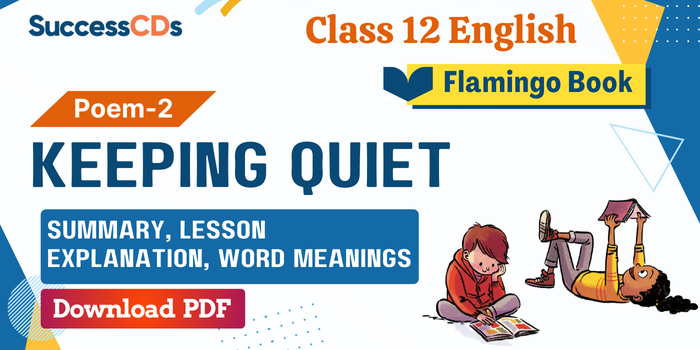CBSE Class 12 English Poem 2 Keeping Quiet Summary, Line by Line Explanation along with Difficult Word Meanings and Literary Devices from Flamingo Book
Keeping Quiet – Here is the Class 12 English Flamingo Book Poem 2 Keeping Quiet Summary and Detailed explanation of the Lesson along with meanings of difficult words. Also, the explanation is followed by the literary devices used in the Poem.
- Theme of the Poem
- Keeping Quiet Introduction
- Keeping Quiet Video Explanation
- Keeping Quiet Summary in Hindi Video Explanation
- Keeping Quiet Summary
- Keeping Quiet Summary in Hindi
- Keeping Quiet Previous Year Questions with Model Answers PDF
- Keeping Quiet Lesson Explanation
Related:
- Keeping Quiet Question Answers
- Keeping Quiet MCQs
- Keeping Quiet Previous Years Question with Answers
Theme of the Poem
The power of silence and thought as a means of comprehending and engaging with the world is the theme of the poem “Keeping Quiet” from the Class 12 English Flamingo textbook. In order to develop a better understanding of themselves and their surroundings, the poet emphasizes on stillness and watching nature. The speaker makes the claim that one can develop a sense of oneness with one’s surroundings and other people by remaining silent and observing. The poem also considers how the modern world may be noisy and distracting and how spending some time to be silent and still can be a helpful strategy for obtaining clarity and inner calm.
Keeping Quiet Introduction
The poem “Keeping Quiet” written by Pablo Neruda discusses the need of maintaining peace and silence. He stresses upon being quiet and harmless to the human beings, animals and environment. He suggests that in order to maintain peace and harmony, it is required to stop and introspect ourselves.
Keeping Quiet Class 12 Video Explanation
Class 12 Important Videos Links
Rhyme scheme of the poem
The poem is written in free verse. It does not follow any rhyme scheme.
Keeping Quiet Summary
Keeping Quiet Summary – “Keeping Quiet” is a peace poem written by the Chilean poet Pablo Neruda. The poet asks humanity to count numbers from one to twelve – twelve being the number of hours shown in a clock or the number of zodiac signs. He requests everyone not to speak because languages create barriers between people. The moment when everyone stops moving their body will be very special and different as we have never experienced such a moment before.
The poet says that in this period of inactivity the fishermen would not harm the whales, the salt gatherers will not hurt their hands, those who are busy destroying the nature will adopt a new approach towards life, The men who are preparing for wars and victory based on deaths of innocent people will join their enemy and stand in unity with them, doing nothing. No one will harm himself or any other person. Everyone will unite and ponder upon his acts and realize the results of his deeds.
The poet clarifies his idea and says further that he does not want that people should stand idle. He wants that there should be no war because he does not want to see trucks laden with dead bodies of the soldiers. He is promoting Universal brotherhood and peace.
The poet says that everyone is working continuously, to achieve one’s goals. People are threatened by death and the fear forces them to work endlessly so that they can achieve everything quickly. In this mad rush, they do not realize the repurcutions of their acts. He wants us to pause and come out of the mad rush. He wants us to be happy about our achivements and celebrate them. He wants us to overcome the fear of death and to relax for a while. We should know the results of our deeds and celebrate our achievements.
When the people will remain quiet for a while, they will realize the purpose of their lives. Just like all the creations of nature undergo a rebirth with the change of seasons, similary, keeping quiet will be a rebirth for the human soul. It will give a new meaning to our life. Again, the poet says that he will count till twelve and asks everyone to remain quiet while he leaves.
Keeping Quiet Summary in Hindi Video Explanation
Keeping Quiet Summary in Hindi
“कीपिंग क्वाइट” चिली के कवि पाब्लो नेरुदा द्वारा लिखित एक शांति कविता है।
कवि मानवता से एक से बारह तक की संख्या गिनने के लिए कहता है। बारह एक घड़ी में दिखाए गए घंटों की संख्या या राशियों की संख्या भी हो सकती। वह सभी से न बोलने का अनुरोध करता है क्योंकि भाषाएं लोगों के बीच अवरोध पैदा करती हैं।
जिस क्षण हर कोई अपने शरीर को हिलाना बंद कर देता है वह पल बहुत ही खास और अलग होगा जैसा कि हमने पहले कभी ऐसे क्षण का अनुभव नहीं किया है।
कवि का कहना है कि निष्क्रियता के इस दौर में मछुआरे व्हेल को नुकसान नहीं पहुंचाएंगे, नमक इकट्ठा करने वाले अपने हाथों को चोट नहीं पहुंचाएंगे, जो प्रकृति को नष्ट करने में व्यस्त हैं वे जीवन के प्रति एक नया दृष्टिकोण अपनाएंगे।
जो लोग निर्दोष लोगों की मौत के आधार पर युद्ध और जीत की तैयारी कर रहे हैं, वे अपने दुश्मन में शामिल हो जाएंगे और उनके साथ एकता में खड़े होंगे, कुछ भी नहीं करेंगे।
कोई भी खुद को या किसी अन्य व्यक्ति को नुकसान नहीं पहुंचाएगा। हर कोई एकजुट होगा और उसके कार्यों पर विचार करेगा और उसके कर्मों के परिणामों को महसूस करेगा।
कवि अपने विचार को स्पष्ट करता है और आगे कहता है कि वह नहीं चाहता कि लोग बेकार खड़े रहें। वह चाहता है कि युद्ध न हो क्योंकि वह सैनिकों के शवों से लदे ट्रकों को नहीं देखना चाहता। वह सार्वभौमिक भाईचारे और शांति को बढ़ावा दे रहे हैं।
कवि कहता है कि प्रत्येक व्यक्ति अपने लक्ष्य को प्राप्त करने के लिए निरंतर कार्य कर रहा है। लोगों को मौत की धमकी दी जाती है और डर उन्हें अंतहीन काम करने के लिए मजबूर करता है ताकि वे सब कुछ जल्दी से हासिल कर सकें। इस भागदौड़ में, उन्हें अपने कृत्यों के प्रतिफल का एहसास नहीं होता है।
वह चाहता है कि हम रुकें और पागलों की भीड़ से बाहर आएं। वह चाहता है कि हम अपनी उपलब्धियों के बारे में खुश रहें और उनका जश्न मनाएं। वह चाहता है कि हम मौत के डर पर काबू पाएं और कुछ देर आराम करें। हमें अपने कर्मों के परिणामों को जानना चाहिए और अपनी उपलब्धियों का जश्न मनाना चाहिए।
Keeping Quiet Previous Year Questions with Model Answers PDF
Download the previous year questions of the Poem Keeping Quiet of class 12 English for free. With the help of this, you can prepare for the exam.
To Download Keeping Quiet Previous Year Questions with Model Answers- Click Here
Keeping Quiet Explanation
POEM
First stanza
Now we will count to twelve
and we will all keep still.
For once on the face of the Earth
let’s not speak in any language,
let’s stop for one second,
and not move our arms so much.
Bonus – Tips to Score 95% in English Paper
- The poet asks everyone to count up to twelve in their mind. The number twelve represents the hours of the day or the months of a year.
- He wants all of us to be calm and still.
- People across the nations have to unite together, so, they shall not speak their own languages, rather they all shall keep quiet and speak the language of silence.
- This will bring unity among all the humans on the face of the Earth.
- For at least one moment, no one shall move his arms either to signal, or to fight, or argue with each other.
The poet here requests everyone to count till twelve in their own mind and to stop for a while. May be this ‘twelve’ referred by the poet is the twelve hours in the clock or the twelve months in an year. He wants everyone to stop and calm down. The poet urges everyone not to speak any language. As we all know that there are different languages spoken in different parts of the earth which sometimes become a barrier in our way for peace. So, he asks people not to speak. Not only this, he also wants us to stop moving our arms. By using the word ‘arms’ he means the weapons which are used by different countries to raise a war against each other. So basically the poet is demanding peace from all of us.
Literary devices:
Assonance: Use of vowel sound ‘o’ and ‘e’ (Now we will count to twelve, not move our arms so much)
Anaphora: Two consecutive lines starting with the word ‘Let’s’
let’s not speak in any language,
let’s stop for one second,
Alliteration: the repetition of a consonant sound at the start of 2 or more closely placed words.
‘we will’ – ‘w’ sound is repeated
POEM Second stanza
It would be an exotic moment
without rush, without engines,
we would all be together
in a sudden strangeness.
Fishermen in the cold sea
would not harm whales
and the man gathering salt
would look at his hurt hands.
Explanation of the poem passage above:
When everything will come to a standstill, it will be a rare situation.
- No one will be in a rush, there will be no engines running.
- Everyone will be calm and quiet, united with each other in a strange atmosphere.
- It will be strange because it has never happened earlier.
- No person would be harming any other living being either for food or to earn his livelihood.
- All the people who work endlessly will get some time to look at their injuries and the damage they have caused to their body.
Poet says that it would be a rare situation when there will be no engines working. Here he wants to stay that if everything comes to standstill, it will be a very different moment. If all the engines like the vehicles and machines stop, then there will be a sudden, strange situation as the world will experience a sudden calmness. People will not be in a rush to achieve material things one after another. Further the poet says that the fisherman will also stop and not harm whales in the sea. This means that the poet is urging everyone not to harm the animals. Here he gives the example of whales which are being hunted for the purpose of food or trade. He also wants people to calm down so that they can stop and see what they have achieved or lost. For this he gives the example of the man who gathers salt, whose hands are hurt. Here he wants everyone to stop for a while in order to see and feel their achievements and how much they have lost for the sake of attaining such materialistic things.
Literary devices:
Alliteration- ‘we would’ – ‘w’ sound is repeated, ‘sudden strangeness’ – ‘s’ sound is repeated, ‘his hurt hands’ – ‘h’ sound is repeated
POEM Third stanza
Those who prepare green wars,
wars with gas, wars with fire,
victory with no survivors,
would put on clean clothes
and walk about with their brothers
in the shade, doing nothing.
What I want should not be confused
with total inactivity.
Life is what it is about;
I want no truck with death.
Explanation of the poem passage above:
- The people who exploit the green wealth of nature by deforestation, or mining, or fishing in the deep seas and the soldiers who use weapons to kill fellow human beings need some time to introspect into the consequences of their actions. They are merely doing their job or following orders.
- He wants them to put on ‘new clothes’ i.e. to adopt a new approach towards life and to realize that killing so many people is not a victory.
- He wants all of us to be united as one, consider our enemy to be our brother.
- He is promoting brotherhood, peace and unity.
- He does not want us to stop our works but to take some time and analyze the results of our deeds.
The poet asks everyone to stop those activities which are damaging the environment. Today all the human beings are making money by damaging the environment with their activities such as mining, deforestation, letting the chemical waste into rivers, etc. The poet asks us not to do so. He also requests people not to involve in wars as there is no benefit of achieving such victory in which no one is left alive. He says so because wars and environmental damage will lead to no life on earth. Rather, he wants people to adopt a new approach towards life and mankind. He says that you should treat your enemy like brothers and promote peace and harmony in the world.
Literary devices:
Alliteration: ‘wars with’ – ‘w’ sound is repeated, ‘clean clothes’ – ‘c’ sound is repeated
Assonance: use of vowel ‘o’ (victory with no survivors, would put on clean clothes and walk about with their brothers)
Repetition: use of ‘war’
POEM Fourth stanza
If we were not so single-minded
about keeping our lives moving,
and for once could perhaps a huge silence
might interrupt this sadness
of never understanding ourselves
and of threatening ourselves with death.
Explanation of the poem passage above:
- All human beings work endlessly with the aim of completing all their tasks.
- They are driven by the target of survival and the threat of death.
- So they are in a mad rush to accomplish all their works.
- He says that perhaps, if they pause for a while, they can appreciate their achievements and their lives would become happier.
- He suggests that by keeping quiet, we will be able to understand the true purpose of our life.
Now the poet wants to clarify to his readers that when he asks them to stop from saying or doing anything, he doesn’t want anyone to become a non active person. Non active is a person who remains idle and doesn’t do anything. Here, he simply means that we should stop and see the consequences of our deeds. The poet doesn’t want to see people being killed due to their greed for money and expansion of territories. Further, he says that people are continuously working to achieve their tasks without even thinking about their results. They are in fear of death and therefore, want to achieve most of the things before their death. Here he urges them to stop for a while and take some moment to relish on what they have achieved till now. Everyone here is living a life in which he wants to achieve various things one after another. But now the poet says it is the time to stop and see what has been achieved and should be enjoyed. This will help us skip the sadness which has become so prominent in our lives. The sadness of not enjoying what we have achieved and the greed to achieve what next is in the list to be achieved.
Literary devices
Alliteration: we were, so single – minded
enjambment: and for once could perhaps a huge silence……..of threatening ourselves with death.
POEM Fifth stanza
Perhaps the Earth can teach us
as when everything seems dead
and later proves to be alive.
Now I’ll count up to twelve
and you keep quiet and I will go.
Explanation of the poem passage above:
The poet suggests us to take a teaching from nature.
- As the Earth undergoes changes, in winter, everything freezes, becomes lifeless but after some time, the season changes again, and everything comes back to life.
- Similarly, taking a pause and introspecting into our lives will give it a new meaning. We will be able to understand the purpose of our life. It will be like a re birth of the soul.
- The poet has conveyed to all the people the purpose of his message and so, he asks them once again to take a pause, count till twelve and walks out of the scene, keeping the scene open for all the people on the Earth to experience this for times to come.
So, now the poet suggests to the human beings that we should learn a lesson from Earth. During the winters everything freezes and becomes lifeless. But when season changes and its the onset of spring season, everything present in the nature such as the trees, birds, rivers, etc gets life. So here, the poet, by giving the example of nature, wants to say that all the human beings should stop and try to judge their deeds. They can try and make their life better with calmness, peace. Finally, he ends up by saying that now he will count upto twelve so that we all may become quiet. Here ‘quiet’ means to calm down ourselves and move towards the path of peace and harmony. After saying this he says ‘I will go’. He says so as he has conveyed his message to the people and wants them to be left alone to think about it and work in the direction of peace.
Also See
Class 12 Important Videos Links
Class 12 English Poem Summary and Explanation
| My Mother at Sixty-Six | Keeping Quiet |
| A Thing of Beauty | A Roadside Stand |
| Aunt Jennifer’s Tigers |
Also See :
- CBSE Class 12 English Notes, Lesson Explanation
- CBSE Class 12 English MCQ Question Answers
- Class 12 English Flamingo Book Chapter wise word meanings
- Class 12 English Flamingo Poems Word meanings
- Class 12 English Vistas Book Word meanings
- CBSE Class 12 English Important Question Answers
- Character Sketch of Class 12 English
- Class 12 English Core Previous Year Question Answers (2019-2024) Chapterwise
- Class 12 English Core Previous Year Question Paper with Solutions 2019-2024





